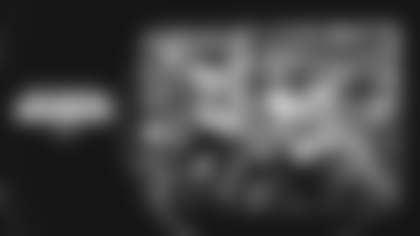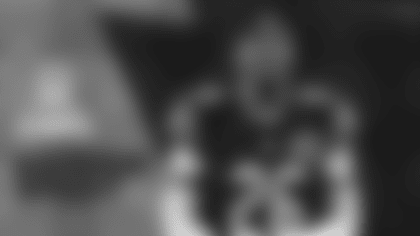Bears general manager Ryan Poles spoke exclusively to ChicagoBears.com senior writer Larry Mayer Wednesday at the NFL Combine in Indianapolis. The following is a transcript of their conversation:
LM: What do you consider the most important aspect of the Combine?
RP: "I really believe it's what we don't see, and that's the medical. You want to minimize the risks that you take on, so knowing how healthy guys are is important. Or know where there's some issues that they need maintenance that you can provide with your staff back at the facility so that they can stay healthy and perform at a high level."
LM: How involved were you with interviewing prospects at the Combine during your 13 seasons with the Chiefs?
RP: "I was in hundreds of those interviews over the years, from the time it was over at the Crowne Plaza to moving it over to the stadium. I've seen a lot of them. I've seen a lot of different things, different personalities, different approaches to it."
LM: What's one funny story involving a prospect interview?
RP: "There was one that stands out. I don't know if it's that funny, but it was funny at the time. A lot of times we ask players what they were taught on tape. We had an offensive lineman in years ago and our coach asked him on a run play, 'What do you call this combination block?' He said, 'Bronco.' And then we went to the next play. It was a completely different play. It might have been a pass play. We asked him what that call was and he said, 'Bronco.' The name of every single blocking scheme was the same. It was bizarre."
LM: What about prospects who have impressed you detailing plays?
RP: "There have been a couple guys. I remember Tyler Lockett. We actually had one last night that was similar. Some of these kids have photographic memories. When you turn on the tape, all you see is the formation in a random game. It's a bunch of clips, so it's not a game in order or sequence; it's just a play. And immediately they'll tell you what the play is, what they did and what the result was, and you haven't hit play yet. It's incredible."
LM: How do you decide which prospects to interview; is it ones you'd like to draft, are seeking more information about or maybe want an explanation for an off-the-field issue?
RP: "It's a combination of all of those. I would say the first group is probably underclassmen. It's players we haven't spent a lot of time with. Well, we haven't spent a lot of time with any of them, but we haven't had a lot of time asking the school about them or different sources about the player's background. So you want to spend time with them because you don't have as much information. And then some of the guys have gone through some things that you just want clarity on. That would be another group. And then just the ones that you like. You just want to see, 'Does the tape and everything you've heard match the personality in the room?'"
LM: Was there ever a prospect who was removed from the Chiefs' draft board during your time in Kansas City based solely on a poor interview?
RP: "Yes. Some of the guys just come in with a bad attitude. The one thing we look for, and it may not take them off the board, but just not taking ownership of things in the past. Like when we watch a play or talk about a mistake they made in life, we're looking for someone to say, 'I messed up. That's on me. This is what I learned from it and this is how I'm going to move on.' That's what we're looking for and some of them just refuse to do that, and it's hard to see progress in a person when you're just not taking ownership of things."
LM: How much weight do you place on the position drills, the bench press, the 40-yard dash and agility drills at the Combine?
RP: "There's an eye test for the positional drills and how they move and their hips. It's all about, 'Does it match the tape?' The other thing is I work with our analytics group; I always have, in Kansas City and I'll do that now. We create scores of a combination of all the drills and all the timed and measured events, and we're looking for guys to fall into a certain range by position. The only time where things will change or we need to do more work is when they fall out of that. If it's poor, that would make us concerned. Or if it's elite and it's an outlier, then we have to make sure, 'Are we missing something, should we move the guy up the board just a little bit because he's got special traits?'"
LM: How would you describe your draft philosophy in terms of taking the best available player on your board, the best available among a group of need positions or drafting for need?
RP: "Generally speaking, you do want to stick with best available. I think that's how you capture value the best on the board. And then if all things are even between four guys and one's in a position that you need and it's a premium position, then you will adjust to that. But you really should have the mindset of best available."
LM: How do you feel about trading up or down: Do you have to be blown away by a prospect to move up and deal away draft capital, or would you prefer to move down to accumulate more picks?
RP: "To move up, it's got to be a special player that really checks all the boxes. We talk about 'Bears Fit,' the guys who represent exactly what we need, and if that matches a high level of performance, that's something that we would consider. In terms of moving back, then it becomes a numbers game, and I work with some of our analytics folks to come up with rules for that on draft day. If you have the ability to maneuver around and you still can get a guy in the proper value for where you're picking, then that might be the best move because then you add draft capital as well."







